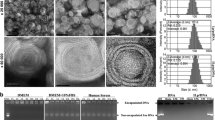Abstract
Inhibition of the neovascularization of tumors has proven efficacious in reducing tumor growth and metastases. Attaining antiangiogenesis through cationic lipid-based systemic gene therapy presents an attractive approach to the treatment of disseminated and primary cancers. Intravenous administration of an endostatin plasmid, complexed with a cationic lipid system, produced significant levels of endostatin in the lung and the circulation. The expressed endostatin blocked systemic angiogenesis and inhibited tumor growth in murine models. Cytokine induction by cationic lipid/DNA complex increased the anti-tumor activities of endostatin. These results demonstrate the possibility of using cationic lipid delivery of an antiangiogenic gene for cancer treatment.
Similar content being viewed by others
References
Hayes AJ, Li LY, Lippman ME. Science, medicine, and the future. Antivascular therapy: A new approach to cancer treatment. BMJ 1999; 318: 853–6.
O'Reilly MS, Holmgren L, Shing Y et al. Angiostatin: A novel angiogenesis inhibitor that mediates the suppression of metastases by a Lewis lung carcinoma. Cell 1994; 79: 315–28.
O'Reilly MS, Boehm T, Shing Y et al. Endostatin: An endogenous inhibitor of angiogenesis and tumor growth. Cell 1997; 88: 277–85.
Folkman J. Antiangiogenic gene therapy. Proc Natl Acad Sci USA 1998; 95: 9064–6.
Crystal RG. The body as a manufacturer of endostatin. Nat Biotechnol 1999; 17: 336–7.
Kong HL, Hecht D, Song W et al. Regional suppression of tumor growth by in vivo transfer of a cDNA encoding a secreted form of the extracellular domain of the flt-1 vascular endothelial growth factor receptor. Hum Gene Ther 1998; 9: 823–33.
Lin P, Buxton JA, Acheson A et al. Antiangiogenic gene therapy targeting the endothelium-specific receptor tyrosine kinase Tie2. Proc Natl Acad Sci USA 1998; 95: 8829–34.
Tanaka T, Cao Y, Folkman J, Fine HA. Viral vector-targeted antiangiogenic gene therapy utilizing an angiostatin complementary DNA. Cancer Res 1998; 58: 3362–69.
Nguyen JT, Wu P, Clouse ME et al. Adeno-associated virus-mediated delivery of antiangiogenic factors as an antitumor strategy. Cancer Res 1998; 58: 5673–77.
Xu M, Kumar D, Stass SA, Mixson AJ. Gene therapy with p53 and a fragment of thrombospondin I inhibits human breast cancer in vivo. Mol Genet Metab 1998; 63: 103–9.
Li H, Lu H, Griscelli F, Opolon P et al. Adenovirus-mediated delivery of a uPA/uPAR antagonist suppresses angiogenesis-dependent tumor growth and dissemination in mice. Gene Ther 1998; 5: 1105–13.
Blezinger P, Wang J, Gondo M et al. Systemic inhibition of tumor growth and tumor metastases by intramuscular administration of the endostatin gene. Nat Biotechnol 1999; 17: 343–48.
Scheule RK, Chen SH. Liposome delivery systems. In Lemone NR, Cooper DN (eds): Gene Therapy. UK: Bios Scientific Publisher 1996; 93–112.
Liu Y, Thor A, Shtivelman E et al. Systemic gene delivery expands the repertoire of effective antiangiogenic agents. J Biol Chem 1999; 274: 13338–44.
Chen QR, Kumar D, Stass SA, Mixson AJ. Liposome complexed to plasmids encoding angiostatin and endostatin inhibit breast cancer in mice. Cancer Res 1999; 59: 3308–12.
Mahato RI, Anwer K, Tagliaferri F et al. Biodistribution and gene expression of lipid/plasmid complexes after systemic administration. Hum Gene Ther 1998; 9: 2083–99.
Brigham KL, Meyrick B, Christman B et al. In vivo transfection of murine lungs with a functioning prokaryotic gene using a liposome vehicle. Am J Med Sci 1989; 298: 278–81.
Liu Y, Mounkes LC, Liggitt HD et al. Factors influencing the efficiency of cationic liposome-mediated intravenous gene delivery. Nat Biotechnol 1997; 15: 167–73.
Boehm T, Folkman J, Browder T, O'Reilly MS. Antiangiogenic therapy of experimental cancer does not induce acquired drug resistance. Nature 1997; 390: 404–7.
Xu L, Pirollo KF, Chang EH. Transferrin-liposome-mediated p53 sensitization of squamous cell carcinoma of the head and neck to radiation in vitro. Hum Gene Ther 1997; 8: 467–75.
Hart SL, Arancibia-Carcamo CV, Wolfert MA et al. Lipid-mediated enhancement of transfection by a nonviral integrintargeting vector. Hum Gene Ther 1998; 9: 575–85.
Freimark BD, Blezinger HP, Florack VJ et al. Cationic lipids enhance cytokine and cell influx levels in the lung following administration of plasmid: Cationic lipid complexes. J Immunol 1998; 160: 4580–6.
Li S, Wu SP, Whitmore M, Loeffert EJ et al. Effect of immune response on gene transfer to the lung via systemic administration of cationic lipidic vectors. Am J Physiol 1999; 276: L796–804.
Author information
Authors and Affiliations
Rights and permissions
About this article
Cite this article
Blezinger, P., Yin, G., Xie, L. et al. Intravenous delivery of an endostatin gene complexed in cationic lipid inhibits systemic angiogenesis and tumor growth in murine models. Angiogenesis 3, 205–210 (1999). https://doi.org/10.1023/A:1009073028842
Issue Date:
DOI: https://doi.org/10.1023/A:1009073028842




